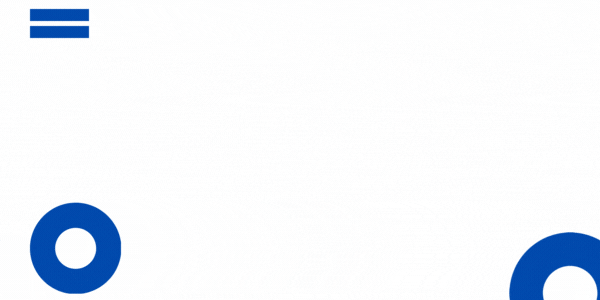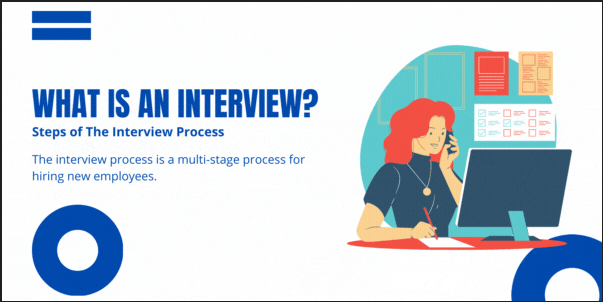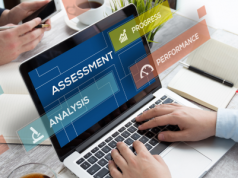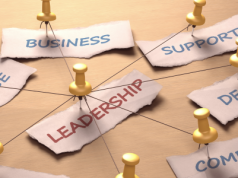 A meeting between a job applicant and an interviewer, who is typically a manager, a member of the human resources department, another employee of the firm, or the employer, defines a job interview. This interview is being conducted to see if the applicant is the best fit for the position.
A meeting between a job applicant and an interviewer, who is typically a manager, a member of the human resources department, another employee of the firm, or the employer, defines a job interview. This interview is being conducted to see if the applicant is the best fit for the position.
The interview process is a crucial part of the hiring process. It assists both the candidate and the employer in deciding whether or not a candidate is the best fit for a position. You might find it helpful to have a thorough understanding of the interviewing process if you are applying for jobs. In this post, we’ll define an interviewing process, go over some typical processes, and offer some advice on how to perform better during interviews.
What is an Interview Process?
Companies employ a multi-step interviewing procedure to choose applicants from a bigger pool. It enables managers and other business stakeholders to determine whether candidates are a suitable match for their organization. The steps and prerequisites for this process can change based on the field, job, and organization for which you’re interviewing.
Steps of the Interview Process
The interview process might vary depending on the policies and procedures of the firm, however, most interviews generally have a similar structure and include the following steps:
- Screening
- Initial interview
- Following Interview
- Third Meetup
- The Decision
- Screening
To decide whether you’re a strong contender for the position, many firms hold a preliminary interview. The screening normally takes fifteen to twenty minutes and can be done over the phone or in person. The list of applicants who will be contacted for formal first interviews will be compiled as and they will be called for further interaction.
- Initial Interview
The first interview is typically the first in-person meeting you have with a potential employer. Their objective is to get to know you and evaluate your qualifications in view of their requirements for the particular position. In order to establish whether you would fit in with the company’s culture, they also want to get to know you. The initial interview normally includes the following phases:
- Introduction
Meeting the interviewer and settling into the interview space take the first few minutes. Make a strong first impression by maintaining good posture, making eye contact with them, and offering a solid handshake because this is also their first encounter with you. Usually, the interviewer spends the first few minutes of the conversation explaining their business to you.
- Interview Inquiries
The majority of the interview comprises of the employer asking you questions, taking notes for subsequent use, and listening to your answers. This section typically lasts for 20 minutes.
- Your Concerns
You have the chance to show off your knowledge, expertise, and the extent of your research on this organization when the interviewer asks you to ask questions. Have three to five meaningful questions prepared, and as the interview progresses, make adjustments based on what you discover.
- Interview’s Conclusion
The interviewer will probably lead you out as soon as the conversation is over. Before getting up from your chair, it’s a good idea to ask all of your questions. Reiterate your enthusiasm for the position as you depart, extend a sincere thank you for the meeting, give them a solid handshake, and maintain eye contact.
If you make an impression during the initial interview, you might be requested to come back for a second interview. You can often meet the various department heads during this meeting, and occasionally you can even take a facility tour. The interviewer will follow up on particular issues from the first interview and ask more detailed questions in an effort to gain a better understanding of how you would adapt to the workplace.
- Following Interview
If you make an impression during the initial interview, you might be requested to come back for a second interview. You can often meet the various department heads during this meeting, and occasionally you can even take a facility tour. The interviewer will follow up on particular issues from the first interview and ask more detailed questions in an effort to gain a better understanding of how you would adapt to the workplace.
- Third Meetup
To help them come to a choice, some employers choose to hold a third interview. You must have a thorough understanding of the business and how it functions currently, as well as some concept of how you might fit into the workplace culture. During this period, there’s a chance that you’ll get to know your future co-workers.
- The Decision
If the firm decides to hire you, the final step in the interview process is typically a job offer based on your background investigation and references. The offer will often be in the form of a typed letter, but sometimes it will also be sent to you by email. In order to ensure that you are comfortable with the terms or give you the opportunity to negotiate before accepting, most employers make an oral offer before providing a written one.
Register for AMCAT | India’s Leading Fresher’s Assessment And Job Site (myamcat.com)
How to withdraw gracefully from the interview process?
- Do it promptly
As soon as you’ve made a choice, it’s preferable to let the employer know that you’re not interested in continuing. Even if you are aware that they are examining other possibilities, do not leave them hanging for days or weeks. You never know what decisions are being made behind closed doors, therefore it’s a professional to provide them with the information they require to continue looking for the ideal candidate.
- Pick The Appropriate Channel
It’s acceptable to send your notice electronically if email has been your primary method of communication with the hiring manager. It’s better to call the hiring manager to break the news if you’re further along in the hiring process, you have a good rapport with them already, or you spoke to them on the phone when they gave you an offer earlier. Just make sure you speak to them directly; don’t leave a voicemail.
It’s acceptable to inform your recruiter of the news and allow them to inform the company if you’ve been working with them for your job search. Or, if you like, you may include a personalized note like the one we provided above to the hiring manager.
- Stay Professional
Always express your gratitude for the hiring manager’s time and thank them for the opportunity. Maintain a professional attitude, even if things didn’t turn out the way you had hoped or you received horrible treatment. You never know when you might cross paths with the same hiring manager in the future, perhaps at a different organization; people have a way of abruptly appearing in our lives later on.
It’s advisable not to burn the bridge with petty or harsh behaviour because there’s always the possibility that you’ll want to apply with this company again in the future under other circumstances.
Within 24 hours of the interview, send the interviewer a thank-you email or letter. Keep it short and sweet, thanking them for the interview and for the opportunity to meet them. Send one to every interviewee who was present. As they continue to consider prospects, this will keep you, your qualifications, and your excitement for the position at the top of their minds.
FAQs:
Q1. What is interview and its process?
Ans. A polite conversation between two or more persons during which a person is asked to obtain the necessary reactions or answers can be described as an interview. In an interview, two groups or two people often sit facing one another.
The hiring of new personnel involves several stages, including the interview process. Writing a job description, posting a job, arranging interviews, doing phone interviews, conducting in-person interviews, following up with candidates, and hiring are all common processes in the interview process.
Q2. What makes a successful interview?
Ans. The following things are required to make an interview successful:
- It lasts longer than 30 minutes
- If the interviewer requests for a follow-up meeting.
- Within one business day, you receive a response to your follow-up.
- If the discussion moves along nicely
- When the interviewer sends out encouraging nonverbal indications.
Q3. What are the steps in conducting an interview?
Ans. The following steps are important for conducting a successful interview:
- Successful introductions by professionals.
- Start off with light conversation
- Outline your objectives for the interview.
- Turn the interview into a discussion.
- Compile significant data.


























